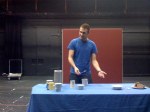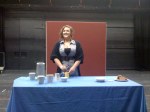The brief for today’s class (which was a half day) was handed out last week. It involved the students having to learn either Hamlets ‘To be, or not to be’ speech or Ophelia’s ‘on Hamlet’s perceived madness’ speech. I wanted to lay a solid grounding for their performance management skills, which were to come. It has always been my belief that to truly manage the rehearsal process effectively then a Stage or Deputy Stage Manager must also have an insight into the process that surround that of a performer. Too many rifts have been created through the misunderstanding between the two disciplines. Most of which have been caused by an ignorance of each others methods and remits.
This exercise can be unpopular, I have no doubt of that and for very good reason. Not many students (with the exception of the acting fraternity) would choose to give up their evenings to ensure that vast amounts of text are committed to memory. This unpopularity is actually the strength behind the task, after a few hours of reading and reading the same few passages, most get frustrated and commit the text to the bin. Through this process of failure, true appreciation can begin to evolve.
The 2nd Year Stage Managers gave it their best shot and I could see the frustration clearly when lines were dropped or forgotten. The task had been compounded by the addition of having to make a cup of tea in the process of recitation. Remembering lines was one thing, but having to do it while dealing with boiling water, pouring milk, adding sugar etc. was near impossible. A safety blanket was added in the form of a partner (DSM) who would prompt if required, though that in itself can be a trap. Once you ask for your first line it becomes a self-made comfort zone and the urge to ask for more and more as the pressure builds can become overwhelming. As for the prompter, human nature nearly always ‘kicks in’ and too many life-lines are thrown, hindering the learning process.
This simple act of learning lines and support is fascinating. The symbiosis between the actor and the Deputy Stage Manager really come to light during this process. After the students finished their recitals we discussed these points at length and I strongly feel that an empathy towards the performer was at least understood, if not heartfelt.
The remainder of the session was dedicated to preparing a working schedule for the production electricians and finding rehearsal provision for tomorrows blocking sessions, which would culminate in a run. I also received two separate emails from the American authors of the plays, allowing me to use them, royalty free and their best wishes attached. I past these messages on to the students to bolster their morale.
A short but extremely engaging day, which had more value attached to it than was first evident.
Ophelia
He took me by the wrist and held me hard;
Then goes he to the length of all his arm;
And, with his other hand thus o’er his brow,
He falls to such perusal of my face
As he would draw it. Long stay’d he so;
At last, a little shaking of mine arm
And thrice his head thus waving up and down,
He raised a sigh so piteous and profound
As it did seem to shatter all his bulk
And end his being: that done, he lets me go:
And, with his head over his shoulder turn’d,
He seem’d to find his way without his eyes;
Hamlet
To be, or not to be: that is the question:
Whether ’tis nobler in the mind to suffer
The slings and arrows of outrageous fortune,
Or to take arms against a sea of troubles,
And by opposing end them? To die: to sleep;
No more; and by a sleep to say we end
The heart-ache and the thousand natural shocks
That flesh is heir to, ’tis a consummation
Devoutly to be wish’d. To die, to sleep;
To sleep: perchance to dream: ay, there’s the rub;
For in that sleep of death what dreams may come
When we have shuffled off this mortal coil.



